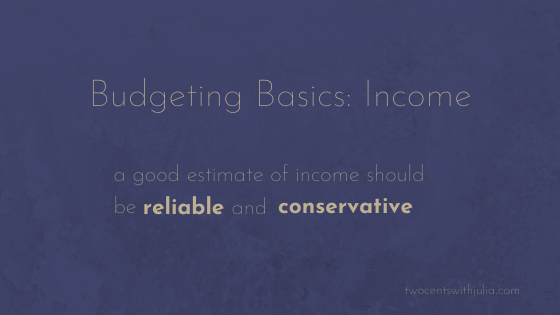Welcome to part two of my Budgeting Basics Series. Last time we covered expenses. Today we’ll be talking about income and what role it plays in every budget. For many, income is pretty straightforward especially if you have a job with regular hours and a set salary. However, there are a lot of situations in which your income may be uncertain or irregular throughout the year. I’m going to discuss things to keep in mind when determining what your income will be this year.
Whether you’re making your money from one job or multiple side gigs, it is important to get a reliable estimate of what your take-home pay will be this year. As always, I like being conservative when estimating my take home pay. Being conservative with regards to income means that I always like to underestimate how much I’ll make so that any error in my calculation will only result in more not less money in my bank account.
Salaried Job
Time performing the job: Will you be starting the job at the same time your budget starts? Will you be ending the job before the end of the year? Even though you may have a yearly salary in mind, remember that if you end your job before a full year, you won’t be paid the full amount.
Bonuses: It is important to consider your budget with and without any bonuses that may come with your job. Even if you are fairly certain you will receive one, making sure you can live without it because you never know what might happen!
Two Cents Tip: If you recently graduated and received a signing bonus with your job, try to put as much of it as possible towards an emergency fund!
Tax Rate: It’s not fun to look at your take-home salary after deducting taxes, however it is necessary in order to fully understand the funds that you have available to you. You can use this tool to estimate your tax rate and read about how your tax bracket is determined.
Commissions: Be realistic with yourself about how much you’ll actually be able to earn through commissions. If you can, make sure you can cover your necessities with just your base pay and use any commission income for wants or savings
Paid by the Hour:
Reliable estimate of paycheck: Try to get a really good sense of how many hours you’ll be able to work. If you’ve worked at the job for a long time before this, look back at old schedules and calculate get a monthly average income. If you’re starting a new job, keep expenses low for a couple months while you’re figuring it out.
Overtime: Always remember to apply the overtime rate to any overtime you expect to work!
Freelancing/Side Gigs/Unpredictable Income:
Quarterly Budget instead of Monthly: If it’s too hard to predict your monthly income, consider using a quarterly budget instead of monthly to plan your short-term expenses.
Record Everything: Make sure to keep detailed records of all your income streams not only for tax purposes, but so that you can go back and base future income projections on old income history.
Whether you’re an accountant, waitress or freelance photographer, it’s always important to get a reliable and conservative estimate of your income before you start building your budget.
Challenge: Now that you know all the things to take into account when estimating your income, I challenge you to come up with a reliable and conservative estimate of both your yearly and monthly income. This will be essential to building your budget!
Keep following my budgeting series to learn more about the other elements of an awesome budget! Next time we will talk all about different ways to save and invest.
